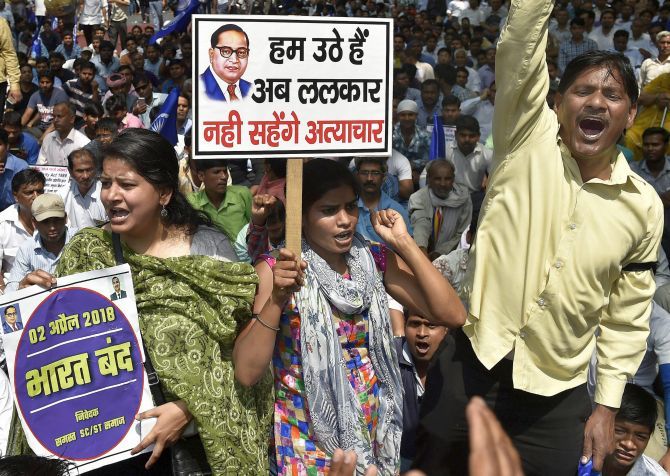Cases of atrocities on scheduled castes decreased from 45,000 in 2014 to 40,800 2016.
Cases of atrocities on scheduled tribes went from 11,451 in 2015 to 6,568 in 2016.
Mayank Jain reports.

IMAGE: Dalits raise slogans during the Bharat Bandh against the alleged dilution of the Scheduled Castes/Scheduled Tribes Act, in New Delhi, April 2, 2018. Photograph: Ravi Choudhary/PTI Photo
Even as nine people died on Monday during nationwide protests by the Dalit community over the recent 'dilution' by the Supreme Court of the provisions of the Prevention of Atrocities against Scheduled Castes/Scheduled Tribes Act, the Supreme Court refused to stay its order on Tuesday in an open court hearing.
But anger in the Dalit community continues to simmer which claims that its rights to a fair trial are being taken away.
An analysis shows there could be an objective basis to the growing perception that atrocities on Dalits are increasing while the conviction rate in these cases is falling.
For instance, there was an increase of 23.6 per cent in cases of atrocities on scheduled castes between 2008 and 2016.
This increase was commensurate with a 17.7 per cent rise in cases of atrocities on scheduled tribes during the same period.
Numerically, there were more than 33,000 cases of atrocities on scheduled castes in 2008, which peaked at 45,000 cases in 2014 while 40,800 cases were recorded in 2016, according to the National Crime Records Bureau data.
Similarly, cases of atrocities on scheduled tribes rose from 5,582 in 2008 to 11,451 in 2015 while 6,568 cases were recorded in 2016, according to the NCRB.
The Supreme Court, in its order on March 20, 2018, removed the provision for automatic arrests of those accused under the Act.
The apex court also directed the police to conduct a preliminary enquiry in seven days when the case is reported before filing the First Information Report.
After the order, public servants can be arrested only after orders from their respective authorities.
Experts see this anger to be justified as they claim that atrocities continue to rise while the system remains heavily weighed against the Dalits.
"In every system there are false positives and false negatives, but the criminal justice system has to deal with them and it does. Any legislation that seeks to rebalance power particularly when the power difference is as extreme as between the Dalits and Savarnas, there is the initial discrimination, and also a huge backlash," says Supreme Court lawyer Karuna Nundy.
While there were false cases across the board, Nundy says the authorities in the criminal justice system were failing to ensure justice for the Dalits.
"The Dalit anger is justified. Yes, nine people died -- every life counts -- one has to look at how many atrocities happened against them in a single day across the country," she says.
"How many Dalit women were harassed or raped? Our criminal justice systems are failing because it is hugely Savarna-weighted," Nundy adds.
The conviction rates in the cases of atrocities on scheduled castes and scheduled tribes have also come down in recent years.
For instance, cases against scheduled castes had a conviction rate of 31.7 per cent in 2008, which stood at 25.7 per cent in 2016.
In the same period, the conviction rate in cases involving atrocities on scheduled tribes reduced from 27.2 per cent to 20.8 per cent.
However, lawyers say the conviction rates could come down for a variety of reasons such as lack of evidence gathering, increased prejudice, pressure on the police, people testifying less because of threats or false cases.
Dalit activist Paul Divakar, general secretary, National Campaign for Dalit Human Rights, says conviction rates were lower because a lot of cases were withdrawn under pressure by Dalits.
"It takes a long time for even an FIR to be lodged to the final conviction, there is immense pressure on victims to revoke their cases or change testimony," says Divakar.
"Also, the cases take so much time in coming to a final conclusion that perpetrators are often able to use money and muscle power to get off the hook."












 © 2025
© 2025